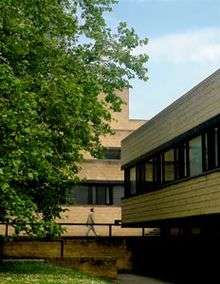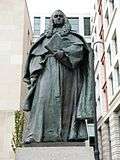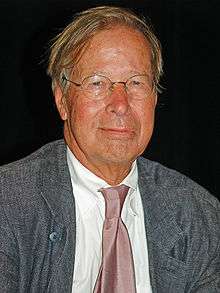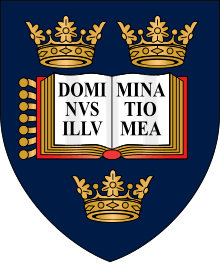Faculty of Law, University of Oxford

The Faculty of Law, Oxford is the law school of the University of Oxford which has a history of over 800 years of teaching and writing law. It is unique in its use of personalised tutorials, in which students are taught by faculty fellows in groups of one to three on a weekly basis,[1] as the main form of instruction in its undergraduate and graduate courses. It offers the largest doctoral programme in Law in the English-speaking world.[2] The faculty is part of Oxford's Social Sciences Division.
Oxford's law school is one of the most prestigious law schools in the world, with an acceptance rate of around 8%. It is currently ranked first in the world in the 2019 Times Higher Education World University Rankings.[3]
Oxford has produced a significant number of luminaries in law and politics, including a United Kingdom Former Prime Minister Tony Blair, twelve Lord Chancellors, nine Lord Chief Justices, nine UK Supreme Court Justices and twenty-two law lords; several heads of state around the world. The current Lord Chief Justice (the most senior judge in England and Wales), Lord Burnett, was educated at Oxford.
History
There were faculties of Civil Law and Canon Law in the medieval University. During the Reformation, Henry VIII prohibited the teaching of Canon Law, instead founding the Regius Chair of Civil Law, one of the oldest Professorships at the University of Oxford. From then until the 19th century, the University awarded the Bachelor of Civil Law and the Doctor of Civil Law, through the Faculty of Civil Law.
William Blackstone, a graduate of Pembroke College, Oxford and subsequently a Fellow of All Souls, Oxford, was appointed the inaugural Vinerian Professor of English Law in 1758, and was the first professor at any university to teach the common law. His lectures formed the basis for his Commentaries on the Laws of England, a definitive source of and case for the study of the English common law.[4][5][6]
It was not until the 1870s that Oxford offered a degree in English law, the BA in Jurisprudence. Not long after, Cornelia Sorabji was the first woman to read Law at Oxford in 1889.[7][8] In the late 19th and early 20th centuries, there were prominent professors in Oxford such as Frederick Pollock, William Anson, and Albert Dicey. The emergence of a large community of legal scholars in twenty-five men's colleges can be dated from the 1920s and 1930s, but the development was consolidated in the 1950s and 1960s, when Law Fellowships also became common in the women's colleges. The Oxford law school flourished through the operation of the resulting internal market, and through the brilliance of particular leading scholars such as H. L. A. Hart, Rupert Cross, Tony Honoré, John Morris, Peter Carter, and others.[9]
In the twentieth century, the BCL became a master's level degree; and, by the 1970s, Oxford developed a large graduate programme in law. It has been claimed that the BCL at Oxford is "the most highly regarded taught masters-level qualification in the common law world".[10] The DPhil in Law, which dates to the 1910s, became popular at that time particularly in international law, comparative law, and philosophy of law; after the 1970s, the areas of research pursued in the doctoral programme broadened to make it a general training ground for legal academics. In 2010 the MSc in Law and Finance (MLF) was introduced and is taught jointly by the Faculty of Law and the Saïd Business School. The MLF programme involves a combination of finance and economic courses combined with BCL law courses.[11] Like the BCL taught at Oxford, entry into the MLF is highly competitive with on average less than fifteen per cent of applicants being accepted.
Programmes offered
The BA in Jurisprudence is Oxford's regular three year undergraduate law degree, equivalent to what in some universities would be called an LLB. It is also a 'qualifying law degree' for the purpose of practice as a solicitor or barrister in England and Wales. It is 'one of the most highly regarded undergraduate law degrees in the UK, and those who do well in it are in high demand both in the legal professions and in other fields in which professional analytical work is required'.[12]
Oxford's graduate law programme is unique: the BCL and MJur (for students from a civil law background) are the only graduate law degrees in the world which are taught through tutorials as well as seminars and lectures. Oxford's graduate law students have closer contact with their teachers than on any LLM. Oxford is renowned for the size, strength, and diversity of its community of legal scholars who are drawn from around the world, and students benefit from the opportunities they are given to discuss their work with leading academics in the field.
Taught programs include: the Bachelor of Civil Law (BCL) - for practitioners and academics alike, Oxford's Bachelor of Civil Law (BCL) degree is the most highly regarded taught masters-level qualification in the common law world;[10] the Oxford Magister Juris (MJur) - designed for outstanding law students from non-common law backgrounds, it is a counterpart to the BCL and shares all its courses; the Masters in Law and Finance (MSc) is taught with the Saïd Business School, and offers outstanding students with a legal background the opportunity to integrate the study of finance with advanced legal study; the Masters in Taxation (MSc) is a two-year part-time postgraduate degree offered and taught in association with the Oxford University Centre for Business Taxation based at Saïd Business School; the Master of Science in Criminology and Criminal Justice (MSc) is a specialist one-year programme run by Oxford's Centre for Criminology; the Master of Philosophy in Criminology (MPhil) is a one-year degree available only to those proceeding from the Oxford MSc in Criminology; the Postgraduate Diploma in Intellectual Property Law and Practice is a one-year part-time masters-level course for people embarking on a career in IP law and practice; the Master of Studies in International Human Rights Law is a part-time graduate degree studied over 22 months, offered by Oxford University's Department for Continuing Education.
Oxford has the largest graduate research programme in Law in the English-speaking world, with a community of about 200 research students engaged in master's and doctoral research across a wide range of legal and interdisciplinary specialisms corresponding to the diverse interests of faculty members. Research students play a central role in the intellectual life of the Faculty, collaborating in numerous discussion groups and seminars. Research programs include: the Master of Studies in Legal Research (MSt) - an entry-level one-year research degree that can also serve as the first year of a DPhil; the Master of Philosophy in Law (MPhil) - a one-year research degree that can also serve as the first year of a DPhil, available only to those proceeding from the Oxford BCL or MJur taught postgraduate programmes; the Master of Letters (MLitt) - an intermediate-level two-year research degree; the Doctor of Philosophy (DPhil) - a major research degree requiring three to four years of study and setting the highest standards of academic achievement.[13]
Rankings and reputation
Global rankings | ||
| QS[14] | 2 | |
|---|---|---|
| Complete[15] |
2 | |
| The Guardian[16] |
2 | |
Oxford's Law Faculty consistently ranks amongst the top three worldwide. Oxford is currently ranked as the best in the UK and second in the world in the latest QS World University Rankings, behind only Harvard Law School;[17] within the UK, it is currently ranked second (behind Cambridge) respectively in the Complete University Guides,[18] Telegraph Rankings,[19] and the Guardian Rankings.[20]
Its acceptance rate was less than 15% in the 2014-15 academic cycle.[21] Oxford's BCL programme has been described as "the most highly regarded taught masters-level qualification in the common law world".[10] A first-class in undergraduate degree in Law or equivalent is a prerequisite (as a guide a student will need to be in the top 5% of his or her graduating class), with the same applying for the Oxford Magister Juris (MJur).
With the Masters in Law and Finance (MSc), Oxford requires an undergraduate degree in law or an outstanding academic record comprising a non-law undergraduate degree and a graduate or professional qualification in law; as for the Postgraduate Diploma in Intellectual Property Law and Practice, an upper second-class undergraduate degree in Law is required. For research programmes, an outstanding record in earlier higher education and the skills and commitment to pursue research to the highest level are required by applicants for postgraduate research programmes. It is very rare for a candidate to be admitted without having completed a degree in Law, except in socio-legal studies and criminology.[13]
Academics
Research centres and Institutes
The Faculty has a number of research centres and institutes:
Research activity groups
Oxford Pro Bono Publico (OPBP)
The Oxford Pro Bono Publico (OPBP) is an organisation consisting of graduate law students and members of faculty to provide high-quality comparative law research, gratis, for lawyers acting pro bono around the world as well as promoting pro bono law in general.[22]
Facilities
St Cross Building

The Law Faculty offices, together with the English Faculty, are situated in the St Cross Building, which is a Grade II* listed building completed in 1964 and designed by Sir John Leslie Martin (architect of the Royal Festival Hall in London) and Colin St John Wilson (architect of the New British Library). The St Cross Building is also home to the Bodleian Law Library.[23][24]
Bodleian Law Library

The Bodleian Law Library was opened in 1964 and holds over 450,000 volumes. It is a Legal Deposit Library, allowing it to claim a copy of any printed legal material published in the United Kingdom or Ireland. It is also an official Documentation Centre for the European Union.[25]
Notable people
Notable people associated with the Faculty of Law include former UK Prime Minister Tony Blair, twelve Lord Chancellors, nine Lord Chief Justices and twenty-two law lords (such as Lord Hoffmann, Lord Denning); several heads of state around the world, including John Turner, Prime Minister of Canada (1984–1984), Seni Pramoj (1947–1951), Prime Minister of Thailand, and several Prime Ministers of Pakistan, including Liaquat Ali Khan (1947–1951), Huseyn Shaheed Suhrawardy (1956–1957), Zulfikar Ali Bhutto (1945–1946).
Notable alumni

 Sir Humphrey Waldock
Sir Humphrey Waldock.jpg) Sir Nicolas Bratza
Sir Nicolas Bratza

Notable academics
- Sir Ian Brownlie
- Vaughan Lowe, QC
- Sir Roy Goode QC
- Professorships
- Chichele Professor of Public International Law
- Professor of Jurisprudence
- Vinerian Professor of English Law
- Freshfields Professor of Commercial Law (current holder: Horst Eidenmüller)
References
- ↑ "Studying at Oxford".
- ↑ "Law in Oxford". Archived from the original on 25 April 2014.
- ↑ "Times Higher Education World University Rankings by Subject 2019 - Law". Times Higher Education. Retrieved 28 September 2018.
- ↑ "Law - All Souls College". Archived from the original on 27 May 2014.
- ↑ "The Pembroke Legal Tradition".
- ↑ "Alumni and other Notable Pembrokians".
- ↑ "First lady - Moneylife".
- ↑ "Celebrating Indian legacy in Oxford". Archived from the original on 27 April 2013.
- ↑ Lawson, F.H. (1968). The Oxford Law School 1850-1960. Oxford University Press.
- 1 2 3 "BCL & MJur 2015/16 E-Brochure". University of Oxford, Faculty of Law. Archived from the original on 22 August 2015. Retrieved 13 August 2015.
- ↑ "MSc in Law and Finance | University of Oxford". www.ox.ac.uk. Retrieved 2016-05-31.
- ↑ "BA in Jurisprudence".
- 1 2 "LLM Guide, University of Oxford".
- ↑ "QS World University Rankings 2019". Quacquarelli Symonds Ltd. Retrieved 6 June 2018.
- ↑ "University League Table 2019". The Complete University Guide. Retrieved 26 April 2018.
- ↑ "University league tables 2019". The Guardian. 29 May 2018. Retrieved 29 May 2018.
- ↑ "QS World University Rankings by Subject 2016 - Law". 2016-03-17. Retrieved 2016-10-05.
- ↑ "Law - Top UK University Subject Tables and Rankings 2017". Retrieved 2016-10-18.
- ↑ "The best UK universities for law". Telegraph.co.uk. Retrieved 2016-10-18.
- ↑ "University guide 2017: league table for law". the Guardian. Retrieved 2016-10-18.
- ↑ "UoO_UG_Admissions". Tableau Software. Retrieved 2016-10-18.
- ↑ "Oxford Law :: OPBP - Oxford Pro Bono Publico". Faculty of Law, Oxford.
- ↑ "The St Cross Building". University of Oxford, Faculty of Law. Retrieved 6 November 2017.
- ↑ "St. Cross Building @ 50". University of Oxford Faculty of Law. October 2014. Retrieved 6 November 2017.
- ↑ "Bodleian Law Library".



